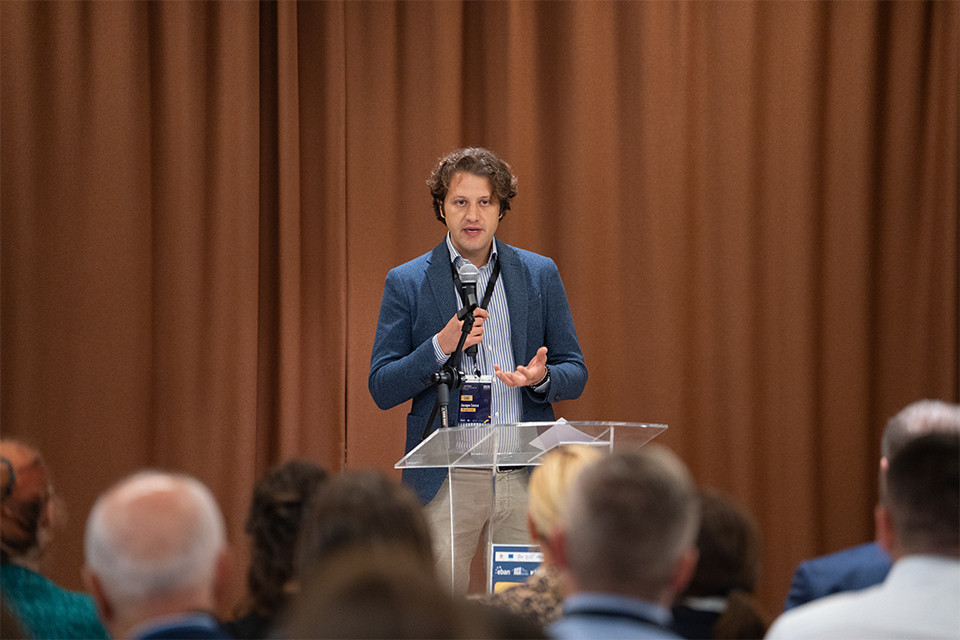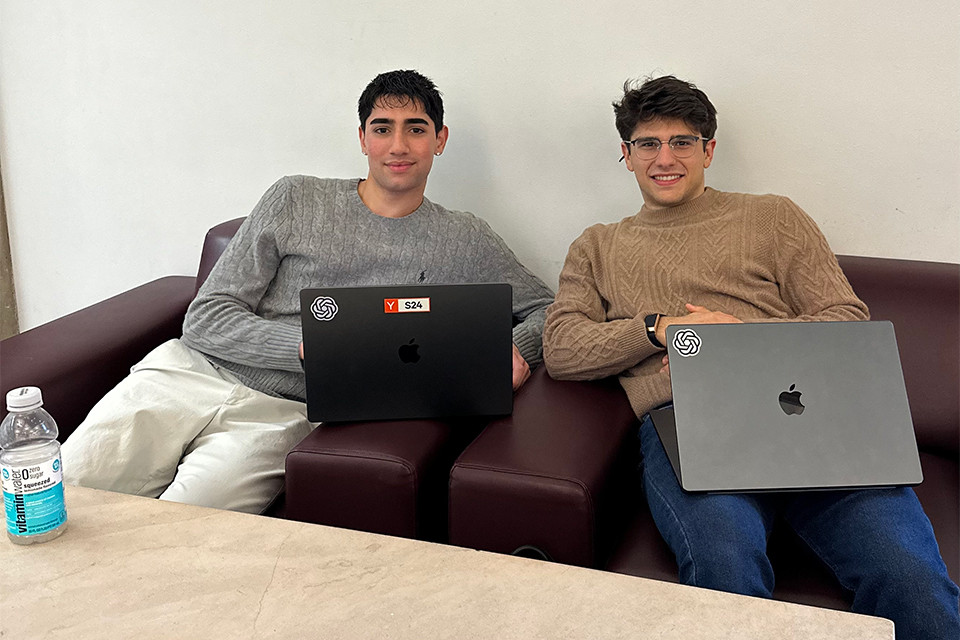-

Jacopo Losso
-

Jacopo Losso
-

Jacopo Losso
-

Jacopo Losso
-

17:29 | 24.09.25 | Articles | exclusive 15257
Jacopo Losso on Cross-Border Investments and Why Armenia Attracts Angels
Angel investing in Europe is at a crossroads. With venture capital activity slowing down, angels are stepping up not just with capital, but with mentorship, networks, and a long-term vision.
At the recent “Gateway to EU” event in Armenia, Jacopo Losso, Director of European Business Angel Network (EBAN), shared with iTel.am his perspective on the state of angel investing, the rise of AI and deep tech, Armenia’s unique strengths, and what founders should keep in mind as they scale globally.
What's the pulse of angel investing in Europe right now?
It’s been two years now where the market hasn’t exactly been falling, but it has definitely faced challenges in sustaining growth. Why? Because overall, the VC market has experienced a slowdown in investments, and that has directly affected angel investors too. As you know, angels are the first link in what I like to call the “investment food chain.”
And they invest first, and then VCs usually follow. But angels depend also on the VC's investment to help their companies to continue to grow. So, if they start to see that there's a bit of a pullback at a later stage, the angels also start to invest less in new companies and continue to help the current companies they already backed who will need cash and will need to continue to grow somehow, but they cannot fundraise anymore from VCs.
 Jacopo Losso
Jacopo Losso
So, I would say it hasn't been a huge contraction because the angels are pretty resilient. And in the interest of keeping their own portfolio companies alive, they invested in those, but they've made less new investments. So, this is bad news also for those founders that were starting a company in 2023 or 2024, fundraising and securing rounds was more difficult. Maybe this year is a little bit better.
How EBAN is adapting to the rise of AI and deep tech startups?
Angels usually invest with a very long-term perspective typically with a 7, 8, 9, even 10-year holding horizon. So, we actually, as angels, started to invest in AI, already, several years before it became a big hype among all of the other kinds of actors in the investment community. So, I would say there is definitely a lot of money from angels going into AI. We’re also seeing more angel investment flowing into deep tech and science-driven businesses. European deep tech, in particular, tends to be very strong scientifically, which creates a solid barrier to entry.
So, interest and investment in deep tech is increasing, even if it hasn’t yet become a mainstream sector. The challenge is that it’s difficult to understand, and these companies often take a long time to reach the market, let alone profitability. They usually require significant capital along the way.
It’s not for every investor. But thanks to networks with deep tech experts, even newcomers, angels without specific technical knowledge, can also enter that investment area.
 Jacopo Losso
Jacopo Losso
Another emerging trend is AI tools being developed specifically for investors. For example, we’ve started speaking with startups that use AI to screen pitch decks at scale, provide scores, and benchmark startups against others. So, there's a lot of interesting stuff happening in AI powering the investment world.
Are angels today just capital providers or more like mentors and advisors, connectors?
It's the second. Of course, angels invest their own capital, but what really defines a business angel is the added value they bring to their commitment to support the company through mentorship and connections. The best examples are often entrepreneurs themselves, people who have sold a company or exited their main business, and now want to give back to the next generation of entrepreneurs. They share not only their knowledge but also their networks, which can help startups succeed faster and with fewer resources. So, angel investing is also about giving back something depending on what you can offer.
What's the biggest mistake founders make when pitching business angels?
One of the most common mistakes we see is entrepreneurs underestimating the market they’re operating in, the level of competition and what it really takes to stand out. Many founders, especially first-time entrepreneurs, can be a little naive on this point.
 Jacopo Losso
Jacopo Losso
Another recurring issue is around funding requests. Founders often ask for too much money too early, without thinking carefully about how to be efficient with capital. So, often entrepreneurs make the very big mistake of not understanding how much funding they need and to quantify that in a smart way. This creates a problem, because business angels may be excluded from the deal simply due to the scale of the task. The reality is that many startups don’t need two, three, or four million euros right away. What they actually need is a few hundred thousand to take the first three or four major steps in their journey. Then fundraise for the millions and upwards.
What unique qualities do you see in Armenian founders?
I like the entrepreneurial mindset that a lot of people here have. There’s this action-oriented spirit, if you want to do something, you get up and do it. That left a strong first impression.
You have amazing tech talent in Armenia and I was really positively surprised. There are many educational programs in Armenia for boys and girls of very young ages to develop technological talent. Like Armath or Tumo, these are amazing initiatives. The foundation of a strong startup ecosystem is exactly that combination: an entrepreneurial mindset where people are willing to take risks and aim to make the world better, paired with the technical skills and talent to actually do it.
So, I think that is what I found most interesting in this first visit to this country.
Would you encourage EBAN members to invest in Armenia?
Absolutely, Armenia already has a strong foundation with its great angel clubs: BANA Angels, STAN Angels, and Angel Investor Club Of Armenia - AICA. They’re backing interesting deals with companies that are “born global” from day one. For international investors, that’s highly attractive. It means they’re not just looking at startups that might succeed only in Armenia, but at companies that launch here and then expand to international markets.
Cross-border investment, however, ultimately comes down to trust. If I know that a local angel group has already met the entrepreneur, done their due diligence, and decided to invest, then I can trust their judgment. That makes my own investment decision much faster and easier. Plus, having a reliable co-investor on the ground that can support the company locally is a huge advantage.
This trust factor is exactly what makes Armenia compelling for foreign investors. With BANA, STAN, and AICA actively engaged, international investors know they have strong local partners to work with, and that creates a powerful incentive to bring more capital into the ecosystem.
Are there any new investments that you're planning to do here or to collaborate with our business angel networks?
During the ‘Gateway to EU’ event we had a showcase of four or five selected Armenian startups backed by BANA, STAN, and AICA. These startups are actively raising funding, and the rounds are open not only to local investors but also to anyone in the audience and across the EBAN community. The hope is that some promising deals will come out of these presentations.
On a personal note, I also came across a very interesting Armenian company through a referral in our network. I won’t name them, don’t want to jinx the deal, but it’s a company we may seriously consider investing in.

That’s the real value of events like this. When strong local networks handpick and showcase their best companies, it creates more opportunities for international investors to join as co-investors. And hopefully, this will lead to more cross-border deals coming out of Armenia.
What's your message or advice to Armenian founders who dream to scale into Europe or globally?
International market entry is something easier said than done. My advice is to fundraise from international investors in the markets you want to grow into and expand in. Why? Because the investors in those new markets you want to enter will help you get introduced to clients, get introduced to other VCs and other investors that can fund you.
And it will make the experience of going international a lot easier.
For early rounds, it makes sense to raise locally, because there's a lot of capital available, a lot of expertise that can guide you. But once you’re ready to scale abroad, invest the time in fundraising from international investors who are based in your target market. They can really give you the value add.
If you want to target Europe specifically, some countries are much easier to enter than others, and market sizes vary significantly. So just pick carefully where you want to go because opening up a new market is a big investment. Don't spread yourself out wanting to go international in 20 different countries on the same day because it's a nightmare.
Nune Grigoryan talked to Jacopo Losso

17:29 | 24.09.25 | Articles
Jacopo Losso on Cross-Border Investments and Why Armenia Attracts Angels








